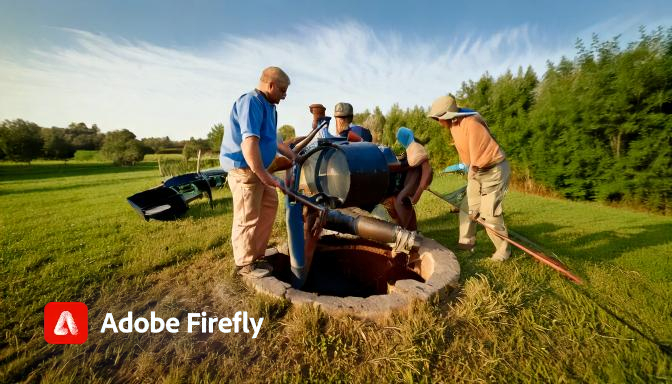Commercial - Residential - Agricultural - Industrial - Environmental - Geothermal - Construction
The Independent Well Drilling team specializes in cleaning water wells that are in need of a thorough, professional cleansing. Like everything else, water wells need to be cleaned in order to maintain the efficiency of the well and the health of the water that runs through it. Our technicians at Independent Well Drilling have been certified to clean water wells, and have years of experience in doing that particular job. We are able to clean wells that are made for residential or commercial use, and we make absolutely sure that the well gets as clean as it possibly can.
Why Get My Well Cleaned?
There are a variety of answers for this question, but the simple answer is that wells get dirty throughout the years, causing a potential health threat. Bacteria is able to thrive in the upper parts of the well, where oxygen can promote growth of aerobic bacteria (that thrive on oxygen), as well as the oxidation of steel/metal. Bacteria growth will lead to a production of a slime that will eventually clog the water well. When the water well is clogged, this slime will trap various minerals.
Additionally, the chemical reactions and bacteria may decrease the amount of oxygen in the lower portions of the water well, making a perfect environment for anaerobic bacteria. This anaerobic bacteria is the root of methane gas, foul odors, a fish-like taste of the water and also hydrogen sulfide. In short, this will contaminate the water in the well. There may also be encrustation that forms on the well if this problem is not tracked down or dealt with early on.
Well Cleaning Procedure:
It is a logical idea for well owners to use chlorination for their water wells; however, this isn’t an absolute insurance of water quality. What the chlorine does is prevent foul taste and odors, but it leaves behind organic materials that may be hazardous to your health because it is potential fuel for bacteria growth. In the long run, chlorine is alright to use, but it doesn’t quite cut it.
Depending on your water well and other certain factors that we will decipher in the inspection process, we will see if your well needs mechanical cleaning or chemical cleaning or even a combination of the two. We will give you all the information that you need in cleaning your well, sharing our knowledge and discoveries throughout the development of the process, as well as the process itself.
Mechanical Cleaning Options
Pressurized air or water to loosen debris or encrustations.
The use of wire brushes or scrapers to loosen the debris.
Sonic waves may also be used, depending on the severity of the clog or encrustation.
Agitation of the water can also help to loosen the bacteria/debris in the well.
Chemical Cleaning Approach
To loosen or dissolve the encrustation, bacteria and/or debris, a variety of acidic liquids may be used. After the harmful materials are loosened, we will pump the well to get the various materials out. In addition, we may also decide to use polymers and caustic chemicals; these chemicals increase the alkalinity of the water, helping to loosen and remove the harmful materials.
We will choose a particular method based on the inspection of your well. Many factors play a role in matching your well to the perfect cleaning method, and you can be sure that our technicians at Independent Well Drilling will make a perfect match every time. The age of the well alone may determine the correct cleaning procedure. If there are corroded areas of the well, the well will most definitely be more fragile, and more aggressive cleaning procedures will be taken out of the picture because they may permanently damage the well. If cleaning is ineffective, the option of new well construction may be the best option to take. We will give you our professional opinion on whether or not your well will benefit from well cleaning.
After we have chosen a cleaning process and executed it to your satisfaction, we will proceed with the disinfection phase. We will follow up on the well cleaning procedure immediately with the disinfection phase.

